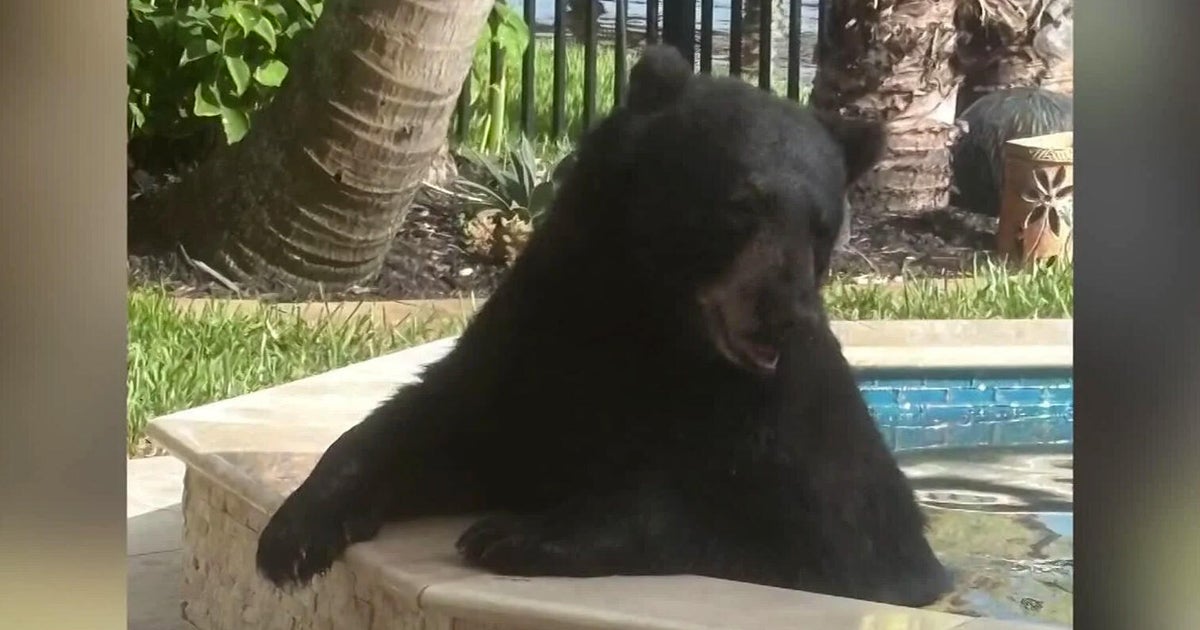Residents of an affluent community in Southwest Florida were shocked to find an uninvited guest in their midst over the weekend, one with fur, claws and a taste for luxury.
On June 8, landscapers at Punta Gorda Isles spotted a black bear running through a backyard and called 911, according to CBS affiliate WINK. Punta Gorda police officers then went to the residence to warn the homeowner about the bear in his yard.
Bear caught on security camera lounging in hot tub and lanai
Homeowner Lynn Martin said at first he thought they were joking — that’s until he checked his home security cameras.
The bear was caught on video taking a dip in his hot tub. It then moved to a couch underneath a lanai, a a type of covered outdoor area commonly found in Hawaiian and Florida architecture.
“He just took the pillows off of the couch and was getting ready to take a nap,” Martin said.
And nap it did — for nearly six hours.
FWC responds with bear trap and hazing techniques
Punta Gorda police contacted the Florida Fish and Wildlife Conservation Commission. They sent officers who placed a trap on the property. FWC officials then used hazing techniques to encourage it to leave. The bear eventually moved to a nearby vacant lot and climbed a tree.
FWC placed a trap at the base of the tree and maintained a presence in the area.
People who live in the neighborhood said the bear clearly meant no harm.
“He’s not looking for any trouble, that’s for sure,” Martin said.
The following day, the bear was spotted napping in another tree in the neighborhood. The FWC waited for the bear to wake before trapping it.
The bear was then safely relocated back to its natural habitat.
Deadly black bear attack reporter near Naples
This was not the first encounter with a black bear in Florida this year. On May 5, black bears attacked and killed a man and his dog near Naples, according to the FWC.
Robert Markel, 89, and his dog were not killed at the same time, according to the FWC which believes more than one bear was involved.
That night, FWC officers killed the three bears in the area. DNA samples from the scene and the bears were sent to Gainesville for testing.
Necropsy results revealed that one bear contained the partial remains of Markel, according to the FWC. Testing showed that the same bear’s DNA was present on Markel’s body, inside his home and on the dog’s body.
Wildlife officials have not explicitly said that bear is the one that killed Markel, an autopsy by the Collier County Medical Examiner found that Markel’s cause of death is consistent with a bear attack.
Florida man bit by bear while protecting dog near Pensacola
A few weeks after Markel’s attack, a man in Gulf Breeze, near Pensacola, reported that he had been bitten by a bear while protecting his dog.
The man said he had just gotten home from work and was letting his dog out when the wild animal charged at them in his backyard.
The man said after the bear bit him, he kicked it in the face. He said that’s when the bear charged him again. He said he was able to make it to the house, shut the door on the bear and call 911. The man was taken to the hospital where he was treated and released.
Florida’s growing black bear population leads to more encounters
Florida’s black bear population, once classified as threatened, has rebounded in recent decades. The state has more than 4,000 black bears, according to the FWC.
Bear sightings and interactions with people have become more common, particularly in rural areas of north and central Florida.
The FWC has an interactive bear map to show bear related calls.
FWC tips: What to do if you encounter a bear
“First things first, stand your ground. Make yourself look large, talk to the bear in a calm fashion. Do not run, do not play dead. If you have small dogs or small children, pick them up. Make yourself look large. If a bear is touching you, you need to fight back. So if you’re in Florida and you know you’re having a conflict with a bear, fight back, because people have successfully been able to fight off bears,” Mike Orlando, the FWC’s bear management program coordinator, said.
He added it’s important to never intentionally approach a bear and never feed one, either intentionally or unintentionally.



